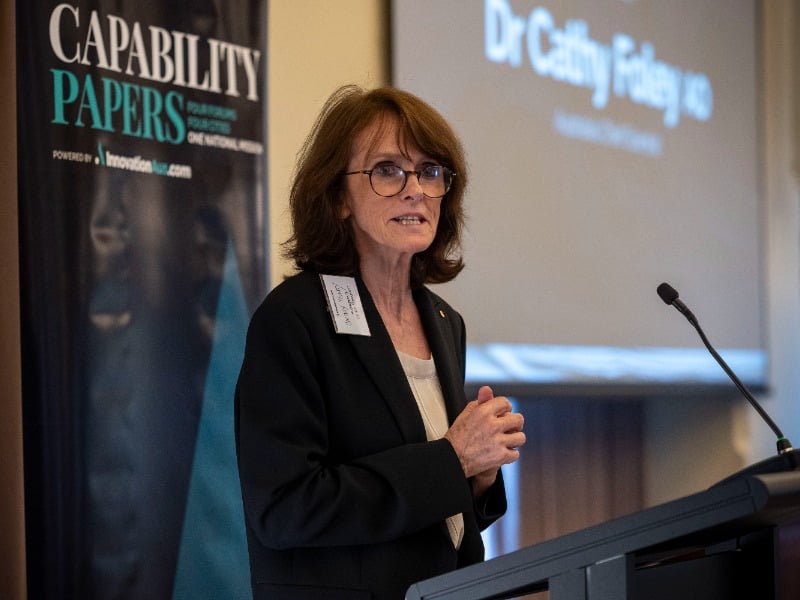The national support infrastructure to help young deep tech entrepreneurs scale their companies has improved dramatically, but there are still some gaps, and areas that might need consideration for future budgets, Australia’s outgoing chief scientist Dr Cathy Foley says.
In a wide-ranging interview ahead of the InnovationAus Awards for Excellence on Wednesday, Dr Foley said young scientists in Australia were much more aware of potential pathways for commercialisation or social impact of their research than in the past. You can book your tickets to the black tie awards dinner here.
Now in her fourth year as Patron of the InnovationAus Awards for Excellence, Dr Foley’s most potent advice to young science entrepreneurs is to get to know the deep tech support systems that are in place – from the CSIRO’s ON Program to Australia’s Economic Accelerator, the Industry Growth Program and the National Reconstruction Fund.
For background, she says that when she was a young scientist in the early 1980s, she grew the first nitride semiconductors in Australia.
“And the end point [of my research] was to write a paper and move on to the next project.”
“The idea of commercialising something was just completely outside the thinking,” she said. “I just didn’t think it was an option. What we’re seeing now though, is a completely different system.”

Dr Foley’s research ultimately did have tremendous impact, including in building sensing products that help to unlock billions of dollars in mineral deposits. But there was not the kind of direct route for taking ideas from a laboratory and into markets in that same way there is today.
As Australia’s chief scientist, Dr Foley says she has had the opportunity to meet many young scientists and says that they are much more attuned to ‘the big picture,’ and to seeking new pathways for continuing their work.
“All of them see [the research] in terms of solving a problem or being part of a bigger picture and seeing a pathway that is not just about ‘when I finish this research, I will get a job at the university’,” she said.
“They’re thinking about different jobs, whether it’s in industry or starting their own business. And that’s very new.”
“The interesting thing is that there are things in place now. There is the ON program that gives people the chance to see whether your ideas have got legs – [which means] going through lean Launch Pad sort of accelerator experience.”
This was very much a legacy of Larry Marshall in setting up the ON program, which started in 2016 is now ongoing and enduring program, she says.
There is the $1.6 billion Australia’s Economic Accelerator through the federal Education department – started by the previous government but continued by Labor – that helps researchers to get the funds to be able to get to their prototypes built and to start a business.
“Then you’ve got the Industry Growth Program – which is grants as well – so that then you can build up your business and get to a point where you’re investable,” Dr Foley said.
And then there’s the NRF and Main Sequence ventures and other venture investors.
“And with that we’ve got the tools in place now. That means a person who’s got an idea can go through and check that it’s worth pursuing and then get support at each stage,” she said. “We haven’t had that before in Australia.”
“For young researchers, my advice would be to start with the ON Program and to see how far you can go – and get those mentors that can help you take your idea and your ambition through [to success].”
As Patron of the InnovationAus Awards for Excellence, Dr Foley hosts a special VIP pre-dinner event for all of the finalists and judges of the Awards.
The keynote speaker is Dr Mary Manning, the Chief Investment Officer at the National Reconstruction Fund. NSW Treasurer Daniel Mookhey will provide an opening address, with federal Assistant Minister for a Future Made in Australia Senator Tim Ayres offering the closing address.
Shadow minister for Science and the Arts, and shadow minister for Government Services and the Digital Economy Paul Fletcher will also present an award.
The InnovationAus Awards for Excellence have grown year-by-year, and 2024 will be the biggest in the event’s history. There are more than 50 finalists across 14 categories, representing some of the most exciting deep tech entrepreneurial talent this country has to offer.
Looking for brand exposure in front of Australia’s tech ecosystem? Purchase a table of 10 for the InnovationAus 2024 Awards for Excellence and have your logo displayed on screens across the venue and in the event programme as a table sponsor.
The InnovationAus 2024 Awards for Excellence are supported by the Australian Computer Society, Investment NSW, Department of Industry, Science and Resources, Technology Council of Australia, TechnologyOne, National Artificial Intelligence Centre, CSIRO’s ON Innovation Program, Reason Group, Q-CTRL, University of New South Wales, South by South West Sydney and IP Australia.
Protecting your great ideas with intellectual property (IP) rights can lead to lasting benefits for your growing business. IP refers to creations of the mind, such as a brand, logo, invention, design or artistic work. Head to the IP Australia website to find out more about IP, and how it might help your business.
Do you know more? Contact James Riley via Email.

